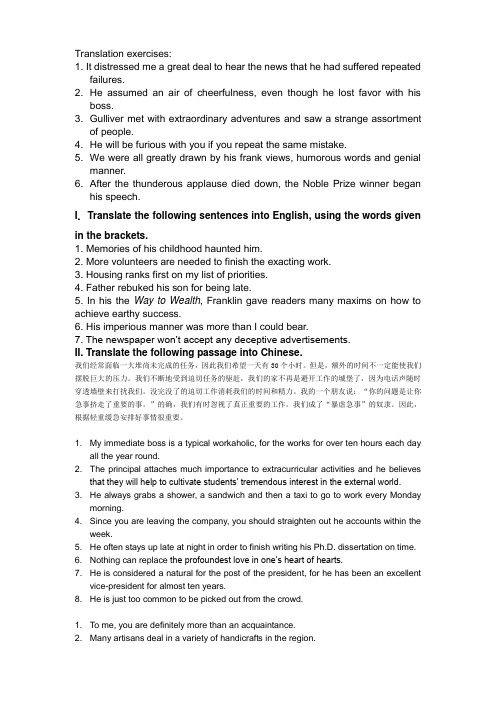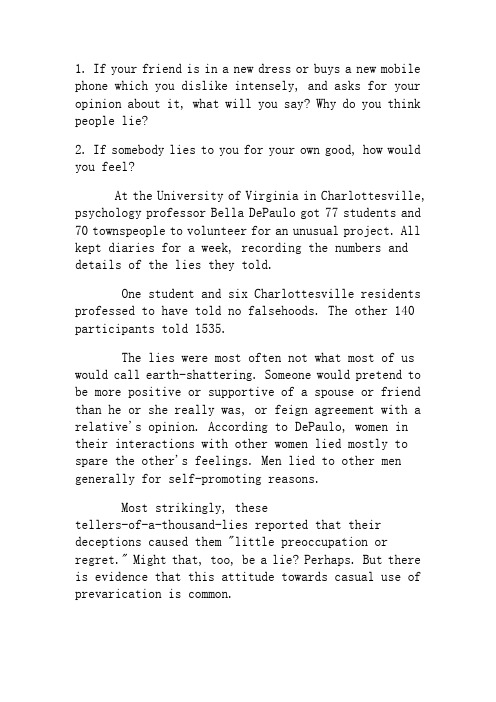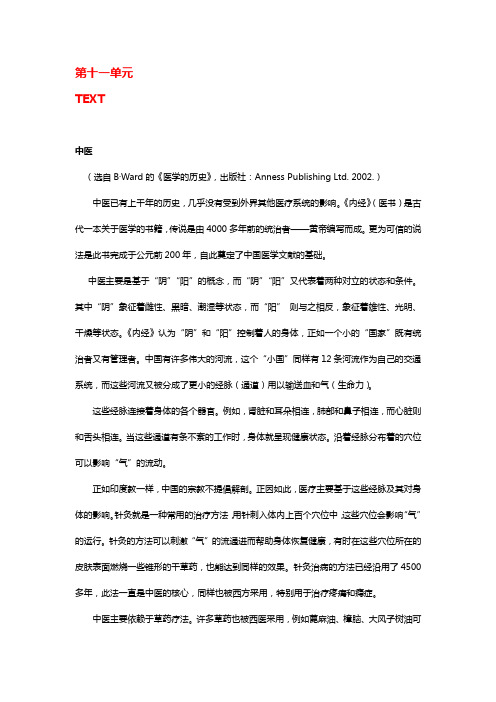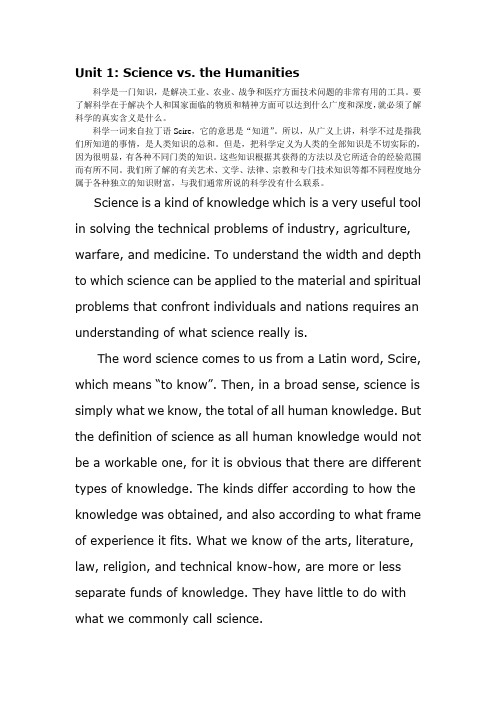公共英语三第十一单元带翻译
综合教程第三册课后翻译第1 2 5 7 8 11单元

Translation exercises:1. It distressed me a great deal to hear the news that he had suffered repeatedfailures.2. He assumed an air of cheerfulness, even though he lost favor with hisboss.3. Gulliver met with extraordinary adventures and saw a strange assortmentof people.4. He will be furious with you if you repeat the same mistake.5. We were all greatly drawn by his frank views, humorous words and genialmanner.6. After the thunderous applause died down, the Noble Prize winner beganhis speech.I.Translate the following sentences into English, using the words given in the brackets.1. Memories of his childhood haunted him.2. More volunteers are needed to finish the exacting work.3. Housing ranks first on my list of priorities.4. Father rebuked his son for being late.5. In his the Way to Wealth, Franklin gave readers many maxims on how to achieve earthy success.6. His imperious manner was more than I could bear.7. The newspaper won’t accept any deceptive advertisements.II. Translate the following passage into Chinese.我们经常面临一大堆尚未完成的任务,因此我们希望一天有30个小时。
大学英语专业综合教程第三册Unit11课文及单词

1. If your friend is in a new dress or buys a new mobile phone which you dislike intensely, and asks for your opinion about it, what will you say? Why do you think people lie?2. If somebody lies to you for your own good, how would you feel?At the University of Virginia in Charlottesville, psychology professor Bella DePaulo got 77 students and 70 townspeople to volunteer for an unusual project. All kept diaries for a week, recording the numbers and details of the lies they told.One student and six Charlottesville residents professed to have told no falsehoods. The other 140 participants told 1535.The lies were most often not what most of us would call earth-shattering. Someone would pretend to be more positive or supportive of a spouse or friend than he or she really was, or feign agreement with a relative's opinion. According to DePaulo, women in their interactions with other women lied mostly to spare the other's feelings. Men lied to other men generally for self-promoting reasons.Most strikingly, these tellers-of-a-thousand-lies reported that their deceptions caused them "little preoccupation or regret." Might that, too, be a lie? Perhaps. But there is evidence that this attitude towards casual use of prevarication is common.For example, 20,000 middle-and high-schoolers were surveyed by the Josephson Institute of Ethics — anonprofit organization in Marina del Rey, California, devoted to character education. Ninety-two per cent of the teenagers admitted having lied to their parents in the previous year, and 73 per cent characterized themselves as "serial liars," meaning they told lies weekly. Despite these admissions, 91 per cent of all respondents said they were "satisfied with my own ethics and character."Think how often we hear the expressions "I'll call you" or "The check is in the mail" or "I'm sorry, but he stepped out." And then there are professions —lawyers, pundits, public relations consultants —whose members seem to specialize in shaping or spinning the truth to suit clients' needs.Little white lies have become ubiquitous, and the reasons we give each other for telling fibs are familiar. Consider, for example, a corporate executive whom I'll call Tom. He goes with his wife and son to his mother-in-law's home for a holiday dinner every year. Tom dislikes her "special" pumpkin pie intensely. Invariably he tells her how wonderful it is, to avoid hurting her feelings."What's wrong with that?" Tom asked Michael Josephson, president of the Josephson Institute. It's a question we might all ask.Josephson replied by asking Tom to consider the lie from his mother-in-law's point of view. Suppose that one day Tom's child blurts out the truth, and she discovers the deceit. Will she tell her son-in-law, "Thank you for caring so much"? Or is she more likelyto feel hurt and say, "How could you have misled me all these years? And what else have you lied to me about?"And what might Tom's mother-in-law now suspect about her own daughter? And will Tom's boy lie to his parents and yet be satisfied with his own character?How often do we compliment people on how well they look, or express our appreciation for gifts, when we don't really mean it? Surely, these "nice lies" are harmless and well-intended, a necessary social lubricant. But, like Tom, we should remember the words of English novelist Sir Walter Scott, who wrote, "What a tangled web we weave, when first we practice to deceive."Even seemingly harmless falsehoods can have unforeseen consequences. Philosopher Sissela Bok warns us that they can put us on a slippery slope. "After the first lies, others can come more easily," she wrote in her book Lying: Moral Choice in Public and Private Life. "Psychological barriers wear down; the ability to make more distinctions can coarsen; the liar's perception of his chances of being caught may warp."Take the pumpkin-pie lies. In the first place, it wasn't just that he wanted his mother-in-law to feel good. Whether he realized it or not, he really wanted her to think highly of him. And after the initial deceit he needed to tell more lies to cover up the first one.Who believes it anymore when they're told that the person they want to reach by phone is "in a meeting"? By itself, that kind of lie is of no great consequence.Still, the endless proliferation of these little prevarications does matter.Once they've become common enough, even the small untruths that are not meant to hurt encourage a certain cynicism and loss of trust. "When [trust] is damaged," warns Bok, "the community as a whole suffers; and when it is destroyed, societies falter and collapse."Are all white lies to be avoided at all costs? Not necessarily. The most understandable and forgivable lies are an exchange of what ethicists refer to as the principle of trust for the principle of caring, "like telling children about the tooth fairy, or deceiving someone to set them up for a surprise party," Josephson says. "Still, we must ask ourselves if we are willing to give our friends and associates the authority to lie to us whenever they think it is for our own good."Josephson suggests a simple test. If someone you lie to finds out the truth, will he thank you for caring? Or will he feel his long-term trust in you has been undermined?And if you're not sure, Mark Twain has given us a good rule of thumb. "When in doubt, tell the truth. It will confound your enemies and astound your friends."New words:volunteerv. to give or offer (one's help, a suggestion, etc.) willingly or without being paidprofessv. to make a claimfeignv. to pretend to have or bepreoccupationn. the state of constantly thinking or worrying about somethingprevaricationn. the state of avoiding giving a direct answer or making a firm decisionseriala. of, in or forming a number of things, events, etc. of a similar kind, especially placed or occurring one after anotherethicsn. moral correctness; moral principlespunditn. a person who is an authority on a particular subject; an expertconsultantn. a person who gives specialist professional advice to othersfibn. a small unimportant liedeceitn. dishonest act or statementlubricantn. a substance such as oil which cause a machine to operate more easilytanglev. to make or become a mass of disordered and twisted threadswear downto reduce or become weaker until uselessperceptionn. the ability to see, hear and understand; the quality of understandingwarpv. to (cause to) turn or twist out of shapeproliferationn. a rapid increase in the amount or number of somethingcynicismn. the belief that people always act selfishlyfalterv. to lose power or strength in an uneven way, thus no longer making much progressassociaten. a person who is connected to another person as a businesspartner, colleague, or companionunderminev. to gradually make somebody or something less strong or effectiveconfoundv. to confuse and greatly surprise people, causing them to be unable to explain or deal with a situationastoundv. to make somebody very surprised or shocked, especially with (news of) something completely unexpected。
大学英语综合教程3 Unit 11

•Prior : (adj.)
• Existing or arranged before the present situation ▫ You do not need any prior knowledge of the subject. ▫ Please give us prior notice if you need an evening meal.
• Not so much…as…
• One description of sth is less correct than another ▫ She was not so much nervous as impatient for the journey to be over. ▫ It’s not so much a hobby as a career(=more like a career than a hobby)
• 1.When they start school, children are curious and ready to try to explore the unknown. However, they end up losing the spirit of discovering after years of formal education. • 2.“Advanced” learners are likely to make mistakes. For example, they may become excessively satisfied with their progress or, on the contrary, put too much pressure on themselves.
• A war correspondent
综合英语教程(第三版)BOOK1-课文译文11.第十一单元

第十一单元TEXT中医(选自B·Ward的《医学的历史》,出版社:Anness Publishing Ltd. 2002.)中医已有上千年的历史,几乎没有受到外界其他医疗系统的影响。
《内经》(医书)是古代一本关于医学的书籍,传说是由4000多年前的统治者——黄帝编写而成。
更为可信的说法是此书完成于公元前200年,自此奠定了中国医学文献的基础。
中医主要是基于“阴”“阳”的概念,而“阴”“阳”又代表着两种对立的状态和条件。
其中“阴”象征着雌性、黑暗、潮湿等状态,而“阳”则与之相反,象征着雄性、光明、干燥等状态。
《内经》认为“阴”和“阳”控制着人的身体,正如一个小的“国家”既有统治者又有管理者。
中国有许多伟大的河流,这个“小国”同样有12条河流作为自己的交通系统,而这些河流又被分成了更小的经脉(通道)用以输送血和气(生命力)。
这些经脉连接着身体的各个器官。
例如,肾脏和耳朵相连,肺部和鼻子相连,而心脏则和舌头相连。
当这些通道有条不紊的工作时,身体就呈现健康状态。
沿着经脉分布着的穴位可以影响“气”的流动。
正如印度教一样,中国的宗教不提倡解剖。
正因如此,医疗主要基于这些经脉及其对身体的影响。
针灸就是一种常用的治疗方法,用针刺入体内上百个穴位中,这些穴位会影响“气”的运行。
针灸的方法可以刺激“气”的流通进而帮助身体恢复健康,有时在这些穴位所在的皮肤表面燃烧一些锥形的干草药,也能达到同样的效果。
针灸治病的方法已经沿用了4500多年,此法一直是中医的核心,同样也被西方采用,特别用于治疗疼痛和瘾症。
中医主要依赖于草药疗法。
许多草药也被西医采用,例如蓖麻油、樟脑、大风子树油可以用来治疗麻风病,铁可以治疗贫血。
众所周知,人参是中国的兴奋剂,用后可使人精力旺盛。
古代的中国人还发明了接种疫苗的方法用以治疗天花。
他们从天花中提取的少量脓汁注射到健康的人体内,使之产生轻微的疾病症状进而对深度感染形成免疫力。
欧洲直到公元1700年才发现了接种疫苗的方法。
研究生公共英语(下)课本翻译

Unit 1: Science vs. the Humanities科学是一门知识,是解决工业、农业、战争和医疗方面技术问题的非常有用的工具。
要了解科学在于解决个人和国家面临的物质和精神方面可以达到什么广度和深度,就必须了解科学的真实含义是什么。
科学一词来自拉丁语Scire,它的意思是“知道”。
所以,从广义上讲,科学不过是指我们所知道的事情,是人类知识的总和。
但是,把科学定义为人类的全部知识是不切实际的,因为很明显,有各种不同门类的知识。
这些知识根据其获得的方法以及它所适合的经验范围而有所不同。
我们所了解的有关艺术、文学、法律、宗教和专门技术知识等都不同程度地分属于各种独立的知识财富,与我们通常所说的科学没有什么联系。
Science is a kind of knowledge which is a very useful tool in solving the technical problems of industry, agriculture, warfare, and medicine. To understand the width and depth to which science can be applied to the material and spiritual problems that confront individuals and nations requires an understanding of what science really is.The word science comes to us from a Latin word, Scire, which means “to know”. Then, in a broad sense, science is simply what we know, the total of all human knowledge. But the definition of science as all human knowledge would not be a workable one, for it is obvious that there are different types of knowledge. The kinds differ according to how the knowledge was obtained, and also according to what frame of experience it fits. What we know of the arts, literature, law, religion, and technical know-how, are more or less separate funds of knowledge. They have little to do with what we commonly call science.Unit5: The Science of Custom对人类学家来说,文化的涵义远胜于修养、品味、温文尔雅、教育以及美术欣赏等。
英语笔译实务 3级配套训练 第十一单元_健康 主题相关英汉词语_汉译英

级配套训练 第十一单元 主题相关英汉词语_汉译英 健 康
launch a nationwide physical fitness campaign; carry out physical fitness programmes involving all our people body-building exercise; fitness exercise body-building and recreational center fitness and entertainment facilities the beauty craze health-care food trace element He is ill. / He has fallen ill. / He has been/was taken ill. He is ill with/suffering from a bad cold. He is down with the flu. He is running a fever/temperature. Are you feeling well / feeling all right? What's your trouble? / What's the matter with you? / What's wrong with you? I feel dizzy / chilly. I have difficulty in breathing. I'm shivering all over. I've got a bad headache / a sore throat / a bad cough. I sneeze a lot and have a running nose. I feel sick. / I feel vomiting. / I want to throw up. Your lips have turned blue. There is blood in my sputum. saliva I have no appetite. / I don't feel like eating anything. The wound was / got inflamed. The inflammation of his lungs is getting worse. I feel a sharp pain / a dull pain in the chest.
新编英语教程3 Unit 11

Text 1
Pre-reading tasks:
• Predict what might be the subject matter of the text, discuss it with your partners. • Discuss the probable writing style: would the narration be similar to the narration in Unit 4? Why and why not?
diagram
• tell the difference of stress between text I and text II on the same figure • discussion: the basic qualities to be a good military leader (What can we learn from Shaka’s success in his military career?)
While-reading tasks:
• Some background information of Zulu and Shaka. • Read the text for the first time to find the main idea and fill in the blanks about the main idea on p133SB. • Discuss what kind of king Shaka was, give supporting details. (1.a great king :a genius in wars and politics ; wise in his personality . 2. a ruthless king)
新标准大学英语综合教程3课文翻译(1-10单元30篇)

Unit 1-1Catching crabs1 In the fall of our final year, our mood changed. The relaxed atmosphere of the preceding summer semester, the impromptu ball games, the boating on the Charles River, the late-night parties had disappeared, and we all started to get our heads down, studying late, and attendance at classes rose steeply again. We all sensed we were coming to the end of our stay here, that we would never get a chance like this again, and we became determined not to waste it. Most important of course were the final exams in April and May in the following year. No one wanted the humiliation of finishing last in class, so the peer group pressure to work hard was strong. Libraries which were once empty after five o'clock in the afternoon were standing room only until the early hours of the morning, and guys wore the bags under their eyes and their pale, sleepy faces with pride, like medals proving their diligence.2 But there was something else. At the back of everyone's mind was what we would do next, when we left university in a few months' time. It wasn't always the high flyers with the top grades who knew what they were going to do. Quite often it was the quieter, less impressive students who had the next stages of their life mapped out. One had landed a job in his brother's advertising firm in Madison Avenue, another had got a script under provisional acceptance in Hollywood. The most ambitious student among us was going to work as a party activist at a local level. We all saw him ending up in the Senate or in Congress one day. But most people were either looking to continue their studies, or to make a living with a white-collar job in a bank, local government, or anything which would pay them enough to have a comfortable time in their early twenties, and then settle down with a family, a mortgage and some hope of promotion.3 I went home at Thanksgiving, and inevitably, my brothers and sisters kept asking me what I was planning to do. I didn't know what to say. Actually, I did know what to say, but I thought they'd probably criticize me, so I told them what everyone else was thinking of doing.4 My father was watching me but saying nothing. Late in the evening, he invited me to his study. We sat down and he poured 抓螃蟹1.大学最后一年的秋天,我们的心情变了。
- 1、下载文档前请自行甄别文档内容的完整性,平台不提供额外的编辑、内容补充、找答案等附加服务。
- 2、"仅部分预览"的文档,不可在线预览部分如存在完整性等问题,可反馈申请退款(可完整预览的文档不适用该条件!)。
- 3、如文档侵犯您的权益,请联系客服反馈,我们会尽快为您处理(人工客服工作时间:9:00-18:30)。
unit11====================unit11-1.----------Title:1.At the Customs.Question:How much does the man want to change?Question:What's the exchange rate for British currency?Question:What should the man do with the Foreign Exchange Certificates?Woman:AMan:BA:Could you change some pounds for me, please?B:Please show me your passport and let me look at the visa.A:Here you are.B:Yes, you got the visa two days ago.That's valid.How much would you like to change?A:Five hundred pounds.What's the exchange rate for British currency today?B:According to the present rate, that's one pound for twelve and half yuan.A:Here are 500 pounds.B:You'll have it right away.Will you please sign your name on this exchange memo?Here is your money.Please check it.Keep this exchange memo.You may need it to convert any money you have left when you leave China.A:Thank you.What exactly should I do with the Foreign Exchange Certificates left with me?B:You may go to the Bank of China or the airport exchange office.A:Thank you.B:You're welcome.unit11-2.----------Title:2.Making a reservation.Question:Has the man ever been to the hotel before? Question:What kind of room does the man want to reserve? Question:Will they go to the hotel?Man:AWoman:BA:Hello.Is Mrs.Brown there?B:Speaking.May I help you?A:My wife and I spent our honeymoon at the inn.B:Did you leave something in the room?A:No, we didn't leave anything in the room.It was two years ago.We'd like to make a reservation for this weekend.B:For how many people?A:For two.B:For how many rooms?A:A double room, please.B:I'm sorry.I am afraid we have no rooms available this weekend.A:What?B:We're completely full.Would a single room be OK?A:Are you sure?B:I'm absolutely certain.A:But?B:If the single room won't do, please try us again another time.A:What a pity!unit11-3.----------Title:3.In a hotel.Question:What does the woman want to do with the dress?Question:Why does she want her overcoat dry-cleaned?Question:What does the other speaker advise her to do?Woman:AMan:BA:I want to have my dress cleaned.I will need it tomorrow afternoon.B:In that case, I'll send it to the laundry right away.A:Yes, please.But I would like it to be starched.B:Yes, but not too stiff, right?A:Exactly.And is it possible to have my overcoat dry-cleaned, too?There are some stains on it.B:I'm afraid you will not have it tomorrow.Dry-cleaning usually takes two whole days.A:Oh, no.I have to wear it tomorrow, too.B:If that's the case, suppose I ask the dry-cleaner to clean up the spots for the moment and have the coat well pressed so that you might get it back in time then.A:That's a good idea.Many thanks.unit11-4.----------Title:4.The following monologue is a comment on the differences between cultures. Question:Why does one country criticize another country?Question:What is the good way to find out what another country is really like?Question:Why are different nationalities seem to be more like each other?Man:MaryMary:Every country tends to accept its own way of life as being the normal one and praise or criticize others as they are similar to or different from it.And unfortunately, our picture of the people and the way of life of other countries is often a distorted one.Here is a great argument in favor of foreign travel and learning foreign languages.It is only by traveling in, or living in, a country and getting to know its inhabitants and their language that one can find out what a country and its people are really like.And the knowledge one gains this way frequently turns out to be very different from the secondhand information gathered from other sources!How often we find that the foreigners whom we thought to be different people from ourselves are not very different after all.Differences between people do exist and, one hopes, will always continue to do so.The world will be a dull place indeed when all the different nationalities behave exactly alike, and some people might say that we are rapidly approaching this state of affairs.With the much greater rapidity and ease of travel, there might seem to be some truth in this at least as far as Europe is concerned.However this may be, the greater ease of travel today has revealed to more people than before that the Englishman or Frenchman or German is not some different kind of animal from themselves.unit11-5.----------Title:AucklandMan:MaryMary:Looking for a vacation spot that combines the excitement of a bustling city with the ease of an island paradise?Then consider Auckland, New Zealand.About 11 hours from Southeast Asia, this city is sandwiched between two harbors on New Zealand's North Island.Mary:Auckland is becoming more famous all over the world for its high quality of life.And if you don't have a lot of vacation time, don't worry.You can experience much of this city in just two days.Mary:Start your first day in downtown Auckland.Go to Queen Street and try climbing the Sky Tower.At 328 meters, it's the tallest structure in the Southern Hemisphere.Inside the tower, you'll find a hotel, a casino, a theater and many restaurants.Mary:The tower's newest attraction is a guided climb up a unique ladder system through the middle of the tower.Trained guides take you up to the top for a stunning view of Auckland.Once on the ground again, make your way to Victoria Park Market.It's just a few minutes' walk from the tower.Mary:Victoria Park Market was originally built in 1905 as an industrial site.But the area was transformed in 1981 into an open-air shopping mall.All the clothes and crafts you'll find here are made locally.So take your time wandering through this special market.Mary:Next, head over to the Viaduct Harbor.Here, you'll find the team bases for the America's Cup.More than four million people came to see this world-famous yacht race last year.Come join the millions of visitors flocking to see the 2003 races next month.Mary:On your second day, wake up early and board a ferry to Waiheke Island.Only 30 minutes away from Auckland, nearly every Aucklander goes there to relax and have fun. Take advantage of the early morning sun and go swimming in the sea.Or you can rent a boat and go sailing.Did you know that Aucklanders own the most boats per capita in the world?No wonder it's called the City of Sails.Mary:You can easily spend the whole day on Waiheke.If you tire of the beach, visit the island's vineyards.Mary:For your next destination, catch a ferry boat to the mainland.Get on the 2 p.m.ferry that stops at the seaside village of Devonport.Make a beeline for any cafe and order some fish and chips.Mary:Finish your whirlwind tour of Auckland by heading back to the Sky Tower.Don't worry.You don't have to climb it again.This time, ride the elevator to the top.Mary:Have a dinner in any of the seven restaurants at the Tower, and take in Auckland's skyline by night.As you admire the splendid view, enjoy some famous New Zealand lamb or some seafood.Then pat yourself on the back for having managed to see this exciting city in just two days.unit11-4 ----------。
